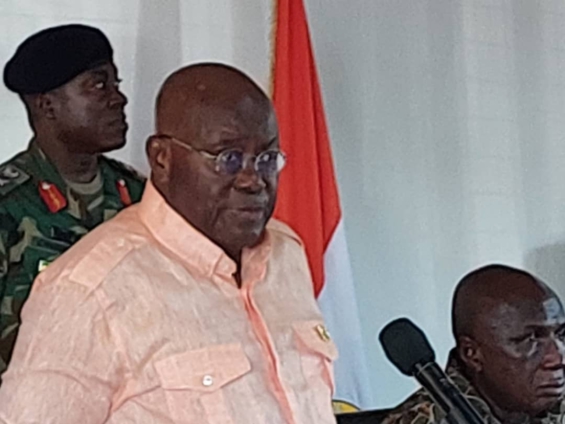
Audio By Carbonatix
The Director of the Institute of Local Government Service, Professor Nicholas Awortwi, says it takes a courageous leader to voluntarily dilute their power for the advancement of a decentralized system of governance.
He was speaking in reference to President Akufo-Addo’s determination to ensure that the 1992 constitution is amended to allow for the election of mayors at the local government level based on a multi-party system rather than the current system where they are appointed by the ruling government.
Describing Article 553 PNDC law 207 as a military regime export which does not reflect the multi-party democratic dispensation of Ghana, he noted that it is time for its amendment.
According to him, its continuous existence in Ghana’s political system has created the tendency where those in power use it to their advantage to appoint their foot soldiers and cronies into local government systems.
Speaking on JoyNews’ PM Express, Prof. Awortwi said, “once a system is put in place and that system benefits some individuals and institutions there’s a tendency for them to hold on to that institution and to not change it because it benefits some people.
“And that’s why we have seen political parties, anytime they’re in opposition they want that change. But when they’re in government, they want it maintained so that they could use the opportunity that it provides to provide jobs for party foot soldiers, for those who actually campaign for them so to fill in the political positions.
“So once you have that political advantage, you wouldn’t want to lose it. And then you will need courage, you will need a leader who says I want to let my power go. And I have done this research in other places. In many countries, especially in Latin America, when they moved from appointment of Mayors to election of Mayors it was a time when the government knew that it was going to lose elections and it did.”
In 2019, President Akufo-Addo had initiated actions to hold a referendum to introduce the multi-party system in Ghana’s local government system.
However, following stiff opposition from the National Democratic Congress and other civil society organization who had raised concerns that the introduction of a multi-party system would increase the polarization of politics in Ghana, the referendum was abandoned.
According to Prof. Awortwi, currently, consensus building is ongoing in order to reach a common agreement on the fate of politics at the local government level, as the President has expressed determination to have mayors elected.
Latest Stories
-
Middle East turmoil threatens to derail Ghana’s single-digit gains
7 minutes -
Free-scoring Semenyo takes burden off Haaland
8 minutes -
Peaky Blinders to The Bride!: 10 of the best films to watch in March
14 minutes -
Crude oil price crosses $91 as Strait of Hormuz blockade chokes 22% of global supply
34 minutes -
Dr. Hilla Limann Technical University records 17% admission surge; launches region’s first cosmetology laboratory
1 hour -
Over 50 students hospitalised after horror crash ends sports tournament
2 hours -
Accra–Dubai flights cancelled as Middle East tensions deepen
2 hours -
See the areas that will be affected by ECG’s planned maintenance from March 1-5
3 hours -
Kane scores twice as Bayern beat rivals Dortmund
3 hours -
Lamine Yamal hits first hat-trick in Barcelona win
3 hours -
Iran says US and Israel strikes hit school killing 108
4 hours -
What we know so far: Supreme Leader Khamenei killed, Trump says, as Iran launches retaliatory strikes
4 hours -
Trump says Iran’s Supreme Leader Ali Khamenei dead after US-Israeli attacks
5 hours -
Ghana cautions nationals against non-essential travel to and from the Middle East as tensions escalate
6 hours -
NAIMOS has failed in galamsey fight; it’s time for a state of emergency – DYMOG to President Mahama
7 hours

